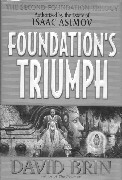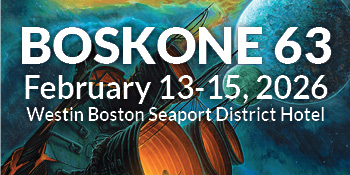
Foundation's Triumph
by David Brin
Harper Prism, 1999, ISBN 0-06-105241-8
SPOILER AHEAD; SKIP IF YOU'RE PLANNING TO READ THIS AND DON'T WANT TO KNOW. This is the third book in the new Foundation trilogy, and it's quite an interesting addition. Hari Seldon, now old, isolated from what's left of his family by the exigencies of the Plan, and no longer a major object of suspicion for the Imperial security forces, decides to pursue a minor mystery brought to him by a minor bureaucrat who has been working at the mathematics of psychohistory as a hobby. The mystery concerns "tilling", the fact that nearly every human-inhabited planet was subjected to a major churning and grinding of the soil, making it suitable for agriculture, before humans arrived--in an expanding wave just ahead of the wave of human colonial expansion, in fact. There are exceptions, though, worlds where the process didn't happen, and substantial amounts of life unlike the life on most human worlds still survives. What do these anomalies mean? Why do they appear to track so well with the distribution of "chaos worlds", the worlds that experience a runaway outbreak of advancing science, art, and technology, before collapsing into equally runaway disaster?
Hari quickly discovers he's on the trail of something very important to psycohistory and the Plan, and Daneel, the Calvinian robots, imperial security, and several other forces are in hot pursuit of him. All fairly standard, except for where Brin takes this. Put simply, not only is psychohistory wrong, in the sense of inaccurate and inadequate to the job Hari's trying to do with it, but the goal is wrong. Hari's Plan rests on certain assumptions about human nature and human capacity that are not correct, based on facts which are incomplete and which have been subjected to seriously flawed analysis by Daneel and Giskard, which have never been checked against the wishes and opinions of humans. And Daneel has deliberately deceived Hari Seldon about these facts. He has done it from the best of motives, but he's wrong. He's concerned only with taking the safest path for the human species, not the best path; because of the Three Laws, and the Zeroth Law, he can't really distinguish between the two. Hari's plan is really Daneel's plan, and it's a mistake. At the end, it appears that Daneel's plan is triumphant; the hope for a genuinely human future--and perhaps a future where humans may finally be able to run the risk of meeting intelligent aliens--is that Hari's Foundation will be more robust than Hari or Daneel have believed, and prevent Daneel's rather horrifying, but very safe, Gaia plan from coming to fruition.
Altogether, a rather darker and more interesting book than I expected.
Other reviews of this book: Review by Mark L. Olson







 Donate to NESFA
Donate to NESFA